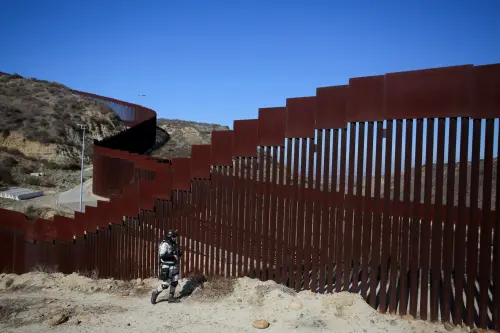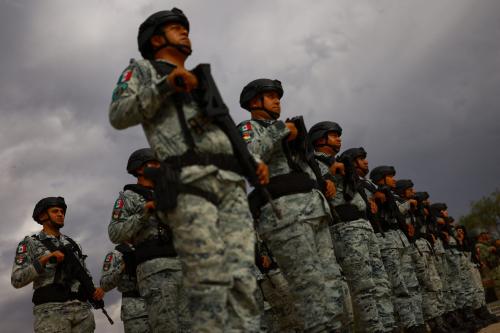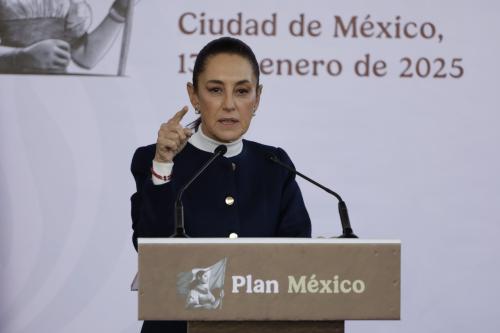Vanda Felbab-Brown discusses Mexico’s Chamber of Deputies recent legislation to legalize the production of cannabis for industrial, medical, and recreational purposes. Should modifications to the law be approved by the Mexican Senate and President Andrés Manuel López Obrador sign the bill into law, Mexico will become the third country in the world to fully legalize all aspects of cannabis consumption and production countrywide, after Uruguay and Canada. Felbab-Brown also compares Mexico’s cannabis legalization efforts to that of Lebanon, Colombia, and Canada. This piece was originally published by La Reforma’s Mexico Today.
On March 10, 2021, Mexico’s Chamber of Deputies legalized production of cannabis for industrial, medical, and recreational purposes. The law now returns to the Mexican Senate that needs to approve the modifications, which it likely will; and then Mexico’s President Andrés Manuel López Obrador needs to sign the bill into law. López Obrador has not been enthusiastic about the legislation but very likely he will sign nonetheless. After all, unlike in many jurisdictions where cannabis legalization came via the ballot, in Mexico it was mandated by the Supreme Court in 2018 after a series of litigations in which the Supreme Court found that criminalization of cannabis violated the constitutional rights of Mexicans. When the law passes, Mexico will be only the third country in the world to fully legalize all aspects of cannabis consumption and production countrywide, after Uruguay and Canada. But other countries have legalized some aspects of cannabis production or consumption, including recently Lebanon and earlier Colombia, and they provide insights to the likelihood that the law and its implementation will deliver the purported and hoped-for outcomes:
- advancement of civil liberties,
- reduction in prison populations,
- reduction in law enforcement abuses and its redirection toward more important priorities,
- economic generation of economic revenues for the government,
- generation of legal income and improvements in social conditions of poor marginalized populations, and
- decrease in violent criminality.
In addition to these standard promised outcomes (which advocates of drug legalization all over the world make), there are other dimensions, such as the environmental impact of the legalization, that are rarely, if ever, discussed.
Here, I discuss the first four. In a forthcoming piece, I will discuss the remaining two – the potential environmental impacts of cannabis legalization in Mexico and likely impacts on violent criminality, drug cartels and criminal groups.
Under the new law, anyone over the age of 18 in Mexico will be able to purchase and possess less than 28 grams of cannabis. A possession of a higher amount, but under 200 grams, is subject to a fine of $500; and a possession of more than 200 grams can land the individual in prison for six years. Adults cultivating more than eight cannabis plants in their home can also be imprisoned for up to ten years. Adults cannot smoke in front of their children, nor in public spaces.
So, what do those regulations say about civil liberties and redirection of law enforcement toward other priorities, such as violent crime? Clearly, the fact that individuals abiding by the law are no longer subject to imprisonment is an advancement of individual rights and civil liberties. However, in the context of pervasive corruption in Mexico, including among street level police officers, there is a strong possibility that officers who want to line their pockets will simply claim that the accosted individual had more than the mandated limit. Such extortion by cops is no different than the pervasive extortion by traffic cops for alleged driving violations one encounters in Mexico. In Brazil, the decriminalization of drug possession for personal use several years ago encountered precisely this problem: Corrupt police officers would extort subjects under claims of higher-than-limit possession: Those who could pay a bribe got off; those who couldn’t or refused to pay ended up booked and faced legal proceedings. Enforcement of the regulation not to smoke marijuana in public will similarly provide rife opportunities for extortion. On the other hand, the rule that no smoking should take place in front of those under 18 is essentially unenforceable, short of extensive raids into peoples’ homes or parties, or the mandated implementation of forced in-home closed-circuit-TV cameras, or mandatory spyware monitoring that China has inflicted on the Uighur population in its egregious repression — measures which are intolerable violations of human rights and will not be adopted in Mexico.
Nor did the decriminalization in Brazil change policing priorities or reduce criminal violence: The latter, in fact, increased as the so-called Pacification Program (UPP) melted down for a variety of unrelated reasons. Since the López Obrador administration has dangerously lessened and misdirected efforts to counter violent criminality, and shows little interest in meaningfully tackling criminal violence and infiltration into government institutions, and deploys its principal policing agency, the National Guard, mainly to stop the flows of migrants to the United States, there is no reason to believe that cannabis legalization will result in the prioritization of sounder policing. Mexico’s policing strategy is warped, but for other reasons.
Might the new legislation succeed in accomplishing its goal of reducing the prison population in Mexico? Hopefully, as long as the aforementioned corruption does not result in false criminal charges. Those imprisoned on cannabis offenses should have already been released. In April 2020, Mexico appropriately passed an amnesty law for minor crimes, including small cannabis possession, nonviolent theft, and abortion. Those people should never been arrested or imprisoned. Yet a year later, none of the 4,000 to 6,000 eligible (due to cannabis offenses) have been released.
What about generating new fat tax revenues and jobs? Many advocates of cannabis legalization in Mexico envision a “green boom” that could bring thousands new jobs and a lot of tax revenues: The firm New Frontier Data, for example, assessed that Mexico’s recreational and medical cannabis market could reach 3.2 billion, while the consultancy company Grand View Research estimated an even peppier $5-6 billion by 2025. Tax revenues could reach $1.7 billion, according to estimates of the Mexico Congress and the Mexican Cannabis and Hemp Council.
Yet similar optimistic predictions have not materialized elsewhere in the world. In Canada, the 2018 legalization was expected to generate billions of riches. The national government’s revenues did increase but far from dramatically, consumers spent far less on legal pot than was expected, and cannabis businesses have since reported millions of losses.
Moreover, Mexico may find itself with many competitors, at least in the export market for medical cannabis and industrial hemp, the two aspects which are assessed to generate far more potential profits for Mexico than the recreational market.
Far on the horizon is Lebanon. In a complete economic and institutional meltdown, Lebanon legalized the cultivation of medical cannabis production (though not any form of consumption) in the spring of 2020. Legalization proposals languished for years, caught up in tensions between the two main Shia forces, Hezbollah and Amal, over the design of any legal regulation and, especially, the control of production. For decades, Lebanon has been the illicit producer of highly desirable hashish known as Red Leb, the profits of which funded both the Iran-linked Hezbollah (much as the militia group-cum-political party denies it on religious grounds) and poor farmers. At various times, the United States sought to induce Lebanon to carry out extensive eradication, but those efforts fizzled a decade and half ago. Forced eradication still takes place, but mostly as a sporadic extortion mechanism by law enforcement of local farmers and as an indirect tool for creating dependence by farmers on the Bekka Valley on Hezbollah. The suppression efforts often are kabuki of various players. Yet the law has not yet been implemented and the regulatory design continues contested. Meanwhile, the prices of Lebanese cannabis and hashish collapsed to an unprecedented degree in 2020.
Colombia is an existing competitor already and fashions itself to have many cannabis production competitive advantages, such as climate and sunshine, allowing its production costs to be low. After Colombia legalized medical cannabis, the cultivation and processing of which requires far more exacting cultivation and processing standards than recreational marijuana, 29 companies in Colombia invested some US $600 million in building production facilities. But transportation costs in Colombia often remain very high, with cannabis extracts frequently having to be flown out from cultivation areas to export transportation hubs.
First, however, new regulatory institutions need to be set up. In Mexico, it is the Institute for the Regulation and Control of Cannabis that will be handing out licenses for cannabis cultivation, processing, sale, research, and import and export. The Institute will also set the maximum levels of tetrahydrocannabinol THC, the psychoactive substance of marijuana, and of cannabidiol (CBD). The Institute is expected to start handing out licenses within six months of the Mexican president’s signing the law, with a further estimated year or year and half before cannabis is legally sold and cultivated in Mexico.
Of course, the size of tax revenues will also be determined by the level of the tax imposed and Mexico’s ability to collect taxes. Set the tax too high and many producers will remain in the illegal market, as happened in California in the initial year after legalization. And tax size apart, tax evasion in Mexico remains a hefty third of estimated revenues.
Will the legalization improve the conditions of Mexico’s impoverished farmers, many of whom illegally cultivated marijuana for decades and bore the brunt of U.S.-encouraged eradication? The activist lawyers who shepherded through the cannabis legalization embraced this element as a crucial objective. They envisioned that the legalization legislation would create reparations for the poor farmers for suffering earlier eradication drives. This ambition has progressively shrunk and there are few auspicious signs. An earlier version of the legislation imagined that 40 percent of cultivation licenses would be reserved for Mexico’s indigenous peoples, communal land farmers, and others assessed as “vulnerable.” The existing version of the law has watered down such commitments significantly.
Moreover, the appropriate effort to prevent the diversion of the legally-cultivated cannabis to the illegal market also makes it very difficult for indigenous, communal, and marginalized farmers to comply with the mandated regulatory requirements. Access to internet and other technologies is required, for example, to comply with seed-to-sale tracing, yet is lacking in indigenous and poor areas of Mexico. Costs for installing security cameras and barbed wires around cultivation plots will be prohibitive for poor farmers. Unless they receive special subsidies (which could be created in the future) for the implementation of the regulations, they will lose out to large agri-businesses. Canadian cannabis companies, such as Canopy Growth, that also have a strong presence in Colombia, are eyeing the Mexican market. For many of the poor farmers, cultivating illegal poppy for heroin will remain a far more economically attractive option than the legal (and highly diminished illegal marijuana) market, unless fentanyl and methamphetamine production continue displacing them.
In Colombia too, the emerging cannabis business has been snapped up by large companies, including Canadian ones, and small farmers mostly cannot compete. They can afford neither the initial investment, nor the recurring transportation costs. The few lucky are hired as laborers on the large farms.
In Lebanon too, many cannabis farmers are not actually happy about the cannabis legalization. They fear the market will be snatched up by the country’s political-economic mafias, like the rest of the country’s economy. And while they do look forward to the prospect of less eradication, in interviews with me, some of them as well as some traffickers confided they intended to sell in illegal markets in the Middle East Gulf, instead of trying to compete in any legal export markets.
The Brookings Institution is committed to quality, independence, and impact.
We are supported by a diverse array of funders. In line with our values and policies, each Brookings publication represents the sole views of its author(s).








Commentary
Mexico’s cannabis legalization, and comparisons with Colombia, Lebanon, and Canada
March 30, 2021